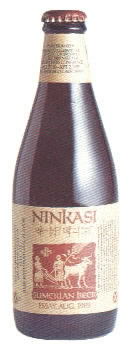
Ninkasi was the Sumerian goddess of beer. She is said to have created a recipe for beer 4000 years ago. Every day she prepares beer for the other gods. Her father was Enki, the lord Nudimmud, and her mother was Ninti, the queen of the Abzu. She is also one of the eight children created in order to heal one of the eight wounds that Enki receives. She was also borne of “sparkling fresh water.” She is the goddess made to “satisfy the desire” and “sate the heart.”
Ninkasi was worshipped in what is now Iraq around 3500 BC, and is thought to be one of the early brewers of beer. At the time ale was made and served exclusively by women.
Anthropologists are generaly divided about what prompted hunter gatherer socities to settle down: bread or beer. To my mind, it certainly seems more plausible that beer could have been discovered by accident, since it required no heat the way bread does. Either way grain was certainly their first harvested crop and it was usually baked and stored. Some 6,000 years ago, an ancient text indicated how this was done. The basic steps included baking, leaving it out, moistening, aging and the voila, intoxication.
Baked grains were broken into pieces and stuffed into a pot. Water, and sometimes aromatics, fruit or honey, were added (creating a basic mash and wort) and left to ferment. Years later, the Babylonians fashioned what we now know as a straw, to extract the juice from the grain pulp in the pot.
Hymn to Ninkasi
The following poem, written around 1800 BCE is known as the Hymn to Ninkasi. It was written by an unkown Sumerian poet on a clay tablet. It actually includes one of the most ancient recipes for brewing beer.
Borne of the flowing water,
Tenderly cared for by the Ninhursag,
Borne of the flowing water,
Tenderly cared for by the Ninhursag,Having founded your town by the sacred lake,
She finished its great walls for you,
Ninkasi, having founded your town by the sacred lake,
She finished it’s walls for you,Your father is Enki, Lord Nidimmud,
Your mother is Ninti, the queen of the sacred lake.
Ninkasi, your father is Enki, Lord Nidimmud,
Your mother is Ninti, the queen of the sacred lake.You are the one who handles the dough [and] with a big shovel,
Mixing in a pit, the bappir with sweet aromatics,
Ninkasi, you are the one who handles the dough [and] with a big shovel,
Mixing in a pit, the bappir with [date] – honey,You are the one who bakes the bappir in the big oven,
Puts in order the piles of hulled grains,
Ninkasi, you are the one who bakes the bappir in the big oven,
Puts in order the piles of hulled grains,You are the one who waters the malt set on the ground,
The noble dogs keep away even the potentates,
Ninkasi, you are the one who waters the malt set on the ground,
The noble dogs keep away even the potentates,You are the one who soaks the malt in a jar,
The waves rise, the waves fall.
Ninkasi, you are the one who soaks the malt in a jar,
The waves rise, the waves fall.You are the one who spreads the cooked mash on large reed mats,
Coolness overcomes,
Ninkasi, you are the one who spreads the cooked mash on large reed mats,
Coolness overcomes,You are the one who holds with both hands the great sweet wort,
Brewing [it] with honey [and] wine
(You the sweet wort to the vessel)
Ninkasi, (…)
(You the sweet wort to the vessel)The filtering vat, which makes a pleasant sound,
You place appropriately on a large collector vat.
Ninkasi, the filtering vat, which makes a pleasant sound,
You place appropriately on a large collector vat.When you pour out the filtered beer of the collector vat,
It is [like] the onrush of Tigris and Euphrates.
Ninkasi, you are the one who pours out the filtered beer of the collector vat,
It is [like] the onrush of Tigris and Euphrates.
Translation by Miguel Civil, Professor Emeritus of Sumerology, The Oriental Institute, and the Department of Near Eastern Languages and Civilizations and Linguistics, The University of Chicago.
The Sumerian Beer Project
In 1988, Anchor Brewery began a project to recreate the beer from Ninkasi’s time as faithfully as possible. This effort was known as the Sumerian Beer Project.

